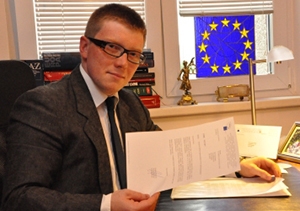- 2013/02/27
Running away from inconvenient facts

On numerous occasions we at EFHR have informed readers about the petition submitted by Mr Tomasz Snarski on the 31st of March 2011, titled “Language rights of Poles in Lithuania”. The petition regarded the main problems on the subject of language rights of the Polish minority – that is, the spelling of names and forenames, labelling settlements or streets in the minority language and educational matters. All points mentioned relate to rights, which should be available on a daily basis in a democratic European state. As it turns out, not everyone holds the same view. On the 24th of April 2012 during the debate on the petition within the European Parliament, the representatives of Lithuania once again demonstrated their irrational reluctance towards respecting national minority rights. The most outrageous fact is that they resorted to obvious lies in order to devalue the weight of the petition and to divert the public discussion to a topic different to that of respecting national minority rights in Lithuania.
The aim of the supplicant was not to throw accusations towards Lithuania as a state or to attack anyone, but to trigger a discussion on the situation of the Polish national minority in Lithuania and to point out areas where the legal regulations are not appropriate for an EU Member State bound by numerous international human rights agreements. However, MPE Vytautas Landsbergis, who is known for his anti-Polish attitude, clearly interpreted this petition as an attempt to paint Lithuania in a negative light. Mr. Landsbergis tried to undermine the petition’s weight by, inter alia, calling it an “unserious document”. He addressed a few matters brought up in the petition and defended the modernised Education Act, at the same time showing his lack of knowledge about the Act itself. Towards the end of his speech, he also absurdly stated that no other national minority – apart from the Polish one – protested against the aforementioned legislation. This is not the first time that Vytautas Landsbergis has triggered international disputes with his questionable views. On the 16th February, Lithuania’s Independence Day, he delivered a speech in which he accused the Polish state of closing schools belonging to the Lithuanian minority in Sejny. The power to do this lies with local authorities, and, in this case, the LA was composed of a significant Lithuanian majority.
The representative of the Lithuanian Ministry of Education, Mrs Milda Špėlytė–Letulienė also took part in the debate. As opposed to MP Landsbergis, she made efforts to defend her state from the accusations made under the petition by presenting key facts, which were intended to show that there is no need for interference with Lithuanian legal regulations regarding national minorities. Nevertheless, many of those so-called facts were debatable. For example, Mrs Špėlytė–Letulienė stated that the Polish minority in Lithuania is the only one to have the possibility of undertaking education in their native language up to university level, but it is a known fact that there is a Swedish-speaking university in Finland, Hungarian university in Slovakia, German university in Italy and so on. The statement that Białystok University’s branch in Vilnius is the only such Polish university abroad is false, as there are more than ten of these around Europe. She also made efforts to defend the Education Act, stating that Lithuania appropriately prepared the teachers and learning materials corresponding to the new learning programme. Many teachers absolutely disagree with that statement and argue that the funds assigned were definitely insufficient and the new learning materials were not sufficiently prepared and contained numerous mistakes.
What conclusion can be drawn from such unfair acts of representatives of Lithuania? The way in which the latter resort to untruths is a clear indicator of the fact that the matter raised by us is right and legitimate. Even if the Lithuanian government resorts to lies in an international discussion, it is obvious that the substantive arguments behind the views presented by them, are simply non-existent.
[wpfilebase tag=file id=583 /]




